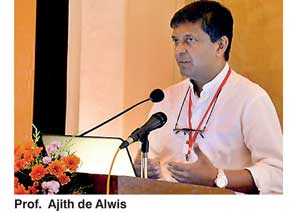Sunday Feb 22, 2026
Sunday Feb 22, 2026
Wednesday, 2 December 2015 00:00 - - {{hitsCtrl.values.hits}}
By Himal Kotelawala
Setting the country a ‘grand challenge’ that incorporates ongoing nano and biotechnology research and development, à la the policy terms set by the US government in the late 1980s for funding high-performance ICT research, could prove immensely beneficial to the industry as well as the country’s economy as a whole, a leading nano-tech expert told Daily FT yesterday.
In a brief interview following a National Consultative Workshop titled ‘Strengthening and Roadmapping of Emerging Technology Innovation Systems of Sri Lanka’ organised by the Coordinating Secretariat for Science Technology and Innovation (COSTI), Project Director Professor Ajith de Alwis said Sri Lanka has the capacity and the talent to achieve big things in emerging technologies like nanotech (NT), biotech (BT) and advanced materials, provided the government, private sector, academia and skills development institutes all work towards a common goal that could potentially have long term benefits for the economy.
“Malaysia has this principle where 1% of its gross national product has to come from the Nano Malaysia Program. Similarly, Sri Lankan planners should think about how we could have 2% of high-tech exports coming out of NT and BT over a period of time,” said Prof. de Alwis.
Sri Lanka has a “huge issue of trade balances,” he said, adding that the objective of COSTI’s program is to have “innovation kicking through to keep our economy moving forward.”
COSTI comes under the purview of the Ministry of Science, Technology and Research and collaborated with Asian and Pacific Center for Transfer of Technology (APCTT) of the United Nations Economic and Social Commission for Asia and the Pacific (UNESCAP) in putting together the workshop.
The country’s wealth of high quality mineral resources could be utilised for the development of advanced materials, Prof. de Alwis told Daily FT.
“Graphite, mineral sands in Pulmudai, our quarts, the magnetite, the huge nanoclay deposit in Mannar and so on. There are a lot of things we can leverage from advanced technology to get highly valuable products and services. Now, how do we map out a strategy for Sri Lanka to benefit from these and to short, medium and long term deliverables to the economy? That is the objective of this exercise,” he said.
When asked about the inevitable bureaucratic roadblocks ambitious projects of this magnitude are prone to encounter, Prof. de Alwis said there was a lack of communication between interested parties such as the private sector and universities.
“Bureaucracy needs to be addressed and policies need to be more streamlined to support innovation. We don’t communicate; there is poor connectivity. All of these issues need to be addressed. That is the innovation ecosystem that COSTI is talking about, that we need to develop in our country,” he said.
Responding to a question about possible scepticism, yet another inevitability with this type of initiative, that nanotech could be just another buzzword with no tangible progress, Prof. de Alwis stressed that, while it is still a relatively young industry, it has made some real breakthroughs.
“It has been around for about two decades now. And one trillion dollars has come through NT. It has been the fastest growing technology – creating an industrial revolution in some sense,” he said.
There is potential for growth in Sri Lanka, too, albeit with some hiccups on the way.
“We have had poor commercialisation of the patents. I think we’re not understanding the value of moving these things. We’re risk averse, more or less, and that is a problem. Our industry needs to change. For the smallest thing, we go and fight for subsidy and support from the government. And we have a huge employment issue. We have both brain drain and brawn drain. We need to factor in these issues. We need to understand what is going to be delivered by the technology,” he said.
All well and good, but it’s nothing without the political will.
“We need to have one grand challenge concept, and driven by the highest office, that Sri Lankans are mobilised to achieve something, with all stocks removed, in this one direction. It’s like the man on the moon type of thing. We also need our grand challenge,” said Prof. de Alwis. Similar to the Korean G25, Sri Lanka, he further said, could plan for a self-reliant economy – a food and energy self-sufficient economy in 20 years time, with this proposed ‘one grand challenge’, ably assisted by NT, BT and other emerging technologies.
“With these technologies, we can build a self-reliant, knowledge based economic system. If we put our hearts together, it’s definitely possible,” said Prof. de Alwis.